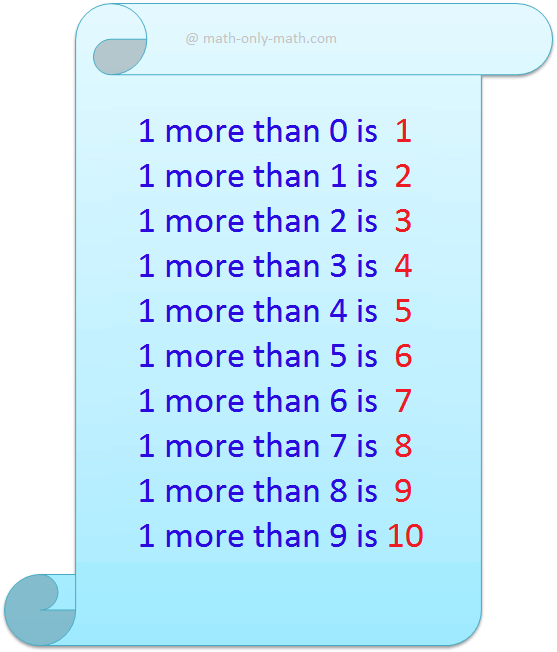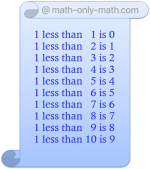Trigonometric Equation using Formula
We will learn how to solve trigonometric equation using formula.
Here we will use the following formulas to get the solution of the trigonometric equations.
(a) If sin θ = 0 then θ = nπ, where n = 0, ± 1, ± 2, ± 3, …….
(b) If cos θ = 0 then θ = (2n + 1) π2, where n = 0, ± 1, ± 2, ± 3, …….
(c) If cos θ = cos ∝ then θ = 2nπ ± ∝, where n = 0, ± 1, ± 2, ± 3, …….
(d) If sin θ = sin ∝ then θ = n π + (-1) n ∝, where n = 0, ± 1, ± 2, ± 3, …….
(e) If a cos θ + b sin θ = c then θ = 2nπ + ∝ ± β, where cos β = c√a2+b2, cos ∝ = a√a2+b2 and sin ∝ = b√a2+b2, where n = 0, ± 1, ± 2, ± 3, …….
1. Solve tan x + sec x = √3. Also find values of x between 0° and 360°.
Solution:
tan x + sec x = √3
⇒ sinxcosx + 1cosx = √3, where cos x ≠ 0
⇒ sin x + 1 = √3 cos x
⇒ √3 cos x - sin x = 1,
This trigonometric equation is of the form a cos θ + b sin θ = c where a = √3, b = -1 and c = 1.
⇒ Now dividing both sides by √(√3)2+(1)2
⇒ √32 cos x - 12sin x = 12
⇒ cos x cos π4 – sin x sin π6 = cos π3
⇒ cos (x + π6) = cos π3
⇒ x + π6 = 2nπ ± π3, where n = 0, ± 1, ± 2, ± 3, …….
⇒ x = 2nπ ± π3 - π6, where n = 0, ± 1, ± 2, ± 3, …….
When we take minus sign with π3, we get
x = 2nπ - π3 - π6
⇒ x = 2nπ - π2, so that cos x = cos (2nπ - π2) = cos π2 = 0, which spoils the assumption cos x ≠ 0 (otherwise the given equation would be meaningless).
So, x = 2nπ + π3 - π6, where n = 0, ± 1, ± 2, ± 3, …….
⇒ x = 2nπ + π6, where, n = 0, ± 1, ± 2, ± 3, ……. is the general
solution of the given equation tan x + sec x = √3.
The only solution between 0° and 360° is x = π6 = 30°
2. Find the general solutions of θ which satisfy the equation sec θ = - √2
Solution:
sec θ = - √2
⇒ cos θ = - 1√2
⇒ cos θ = - cos π4
⇒ cos θ = cos (π - π4)
⇒ cos θ = cos 3π4
⇒ θ = 2nπ ± 3π4, where, n = 0, ± 1, ± 2, ± 3, …….
Therefore, the general solutions of θ which satisfy the equation sec θ = - √2 is θ = 2nπ ± 3π4, where, n = 0, ± 1, ± 2, ± 3, …….
3. Solve the equation 2 cos2 x + 3 sin x = 0
Solution:
2 cos2 x + 3 sin x = 0
⇒ 2(1 - sin2 x) + 3 sin x = 0
⇒ 2 – 2 sin2 x + 3 sin x = 0
⇒ 2 sin2 x – 3 sin x – 2 = 0
⇒ 2 sin2 x - 4 sin x + sin x – 2 = 0
⇒ 2 sin x(sin x - 2) + 1(sin – 2) = 0
⇒ (sin x - 2)(2 sin x + 1) = 0
⇒ Either sin x - 2 =0 or 2 sin x + 1 = 0
But sin x – 2 = 0 i.e., sin x = 2, which is not possible.
Now form 2 sin x + 1 = 0 we get
⇒ sin x = -½
⇒ sin x =- sin π6
⇒ sin x = sin (π + π6)
⇒ sin x = sin 7π6
⇒ x = nπ + (1)n7π6, where, n = 0, ± 1, ± 2, ± 3, …….
Therefore, the solution for the equation 2 cos2 x + 3 sin x = 0 is x = nπ + (1)n7π6, where, n = 0, ± 1, ± 2, ± 3, …….
Note: In the above trig equation we observe that there is more than one trigonometric function. So, the identities (sin 2 θ + cos 2 θ = 1) are required to reduce the given equation to a single function.
4. Find the general solutions of cos x + sin x = cos 2x + sin 2x
Solution:
cos x + sin x = cos 2x + sin 2x
⇒cos x - cos 2x - sin 2x + sin x = 0
⇒ (cos x - cos 2x) - (sin 2x - sin x) = 0
⇒ 2 sin 3x2 sin x2 - 2 cos 3x2 sin x2 = 0
⇒ sin x2 (sin 3x2 - cos 3x2) = 0
Therefore, either, sin x2 = 0
⇒ x2= nπ
⇒ x = 2nπ
or, sin 3x2 - cos 3x2 = 0
⇒ sin 3x2 = cos 3x2
⇒ tan 3x2 = 1
⇒ tan 3x2 = tan π4
⇒ 3x2= nπ + π4
⇒ x = 13 (2nπ + π2) = (4n + 1)π6
Therefore, the general solutions of cos x + sin x = cos 2x + sin 2x are x = 2nπ and x = (4n+1)π6, Where, n = 0, ±1, ±2, …………………..
5. Find the general solutions of sin 4x cos 2x = cos 5x sin x
Solution:
sin 4x cos 2x = cos 5x sin x
⇒ 2 sin 4x cos 2x = 2 cos 5x sin x
⇒ sin 6x + sin 2x = sin 6x - sin 4x
⇒ sin 2x + sin 4x =0
⇒ 2sin 3x cos x =0
Therefore, either, sin 3x = 0 or, cos x = 0
i.e., 3x = nπ or, x = (2n + 1)π6
⇒ x = nπ3 or, x = (2n + 1)π6
Therefore, the general solutions of sin 4x cos 2x = cos 5x sin x are nπ3 and x = (2n + 1)π6
- General solution of the equation sin x = ½
- General solution of the equation cos x = 1/√2
- General solution of the equation tan x = √3
- General Solution of the Equation sin θ = 0
- General Solution of the Equation cos θ = 0
- General Solution of the Equation tan θ = 0
- General Solution of the Equation sin θ = sin ∝
- General Solution of the Equation sin θ = 1
- General Solution of the Equation sin θ = -1
- General Solution of the Equation cos θ = cos ∝
- General Solution of the Equation cos θ = 1
- General Solution of the Equation cos θ = -1
- General Solution of the Equation tan θ = tan ∝
- General Solution of a cos θ + b sin θ = c
- Trigonometric Equation Formula
- Trigonometric Equation using Formula
- General solution of Trigonometric Equation
- Problems on Trigonometric Equation
11 and 12 Grade Math
From Trigonometric Equation using Formula to HOME PAGE
Didn't find what you were looking for? Or want to know more information about Math Only Math. Use this Google Search to find what you need.
Recent Articles
-
Word Problems on Multiplication and Division of Fractions | Worksheet
Apr 12, 25 03:45 AM
word problems on multiplication and division of fractions -
One More than Numbers upto 10 | Counting One More | Learn 1 more Than
Apr 11, 25 04:09 PM
1 more than means we need to add or count one more number to the given numbers. Here, we will learn counting one more than upto number 10. Examples of counting 1 more than up to number 10 are given as… -
One Less than Numbers upto 10 | Counting One Less | Learn 1 Less Than
Apr 11, 25 04:07 PM
What is one less than? 1 less than means we need to subtract or count one less number of the given numbers. Here, we will learn counting one less than upto number 10. Examples of counting 1 less than… -
Properties of Multiplication and Division of Fractions Worksheet | Ans
Apr 10, 25 03:17 PM
In properties of multiplication and division of fractions worksheet you will get different types of questions based on properties of multiplication of fractional numbers and properties of division of… -
Word Problems on Fraction | Math Fraction Word Problems |Fraction Math
Apr 09, 25 01:44 AM
In word problems on fraction we will solve different types of problems on multiplication of fractional numbers and division of fractional numbers.



New! Comments
Have your say about what you just read! Leave me a comment in the box below. Ask a Question or Answer a Question.